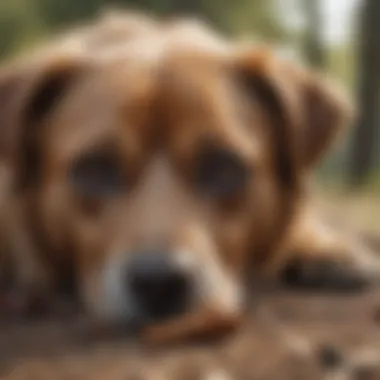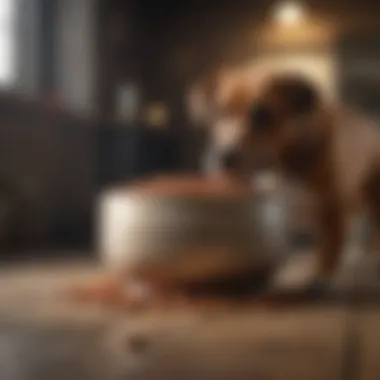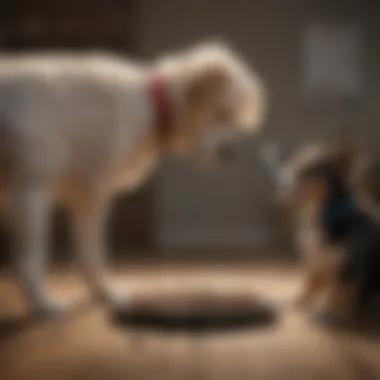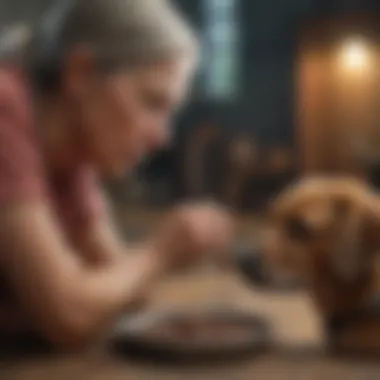Understanding Coprophagia in Older Dogs: Causes and Solutions


Intro
Coprophagia, or the consumption of feces, is a behavior that can leave dog owners perplexed, especially when it occurs in older dogs. This article seeks to shed light on the potential reasons behind this behavior, particularly focusing on the nuances that make it particularly concerning for aging canines. The motivations for this act may vary widely, encompassing health issues, nutritional deficiencies, and behavioral triggers.
Animal Overview
The domestic dog, known scientifically as Canis lupus familiaris, is a direct descendant of wolves. Dogs have been companions to humans for thousands of years, serving various roles from hunting partners to beloved pets.
Common Names
The domestic dog is commonly referred to simply as
Prolusion to Coprophagia in Dogs
Coprophagia, the act of consuming feces, presents an alarming and often distressing behavior among dogs, particularly as they age. Understanding this topic is essential for dog owners who encounter this issue. Whether due to health concerns or nutritional imbalances, recognizing why an old dog may start eating poop can help owners respond appropriately.
Firstly, addressing coprophagia can significantly improve the quality of life for the dog. It is not only a behavioral concern but also a potential indicator of underlying health problems. Moreover, the presence of this behavior can impact the bond between the pet and the owner, fostering feelings of confusion or frustration.
Educating oneself on coprophagia encourages proactive measures. Pet owners can learn about the various factors that contribute to this behavior, which may include dietary needs or mental health issues. Additionally, understanding the prevalence of this behavior and its causes can lead to timely consultations with veterinarians. This ensures that dogs receive appropriate care and attention.
In summary, a thorough exploration of coprophagia arms dog owners with knowledge, helping them navigate this complex behavior thoughtfully and effectively.
Defining Coprophagia
Coprophagia is specifically defined as the act of dogs consuming their own feces or that of others. This behavior can be seen in dogs of all ages but is noted to be more prevalent in older dogs. By understanding the definition, we can start to unravel the reasons behind this troubling behavior.
The act can seem confusing and repulsive to humans. However, it is important to remember that dogs operate on different instincts and sensory cues. Their sense of taste and smell is vastly different from ours, potentially making feces appear as attractive food.
Prevalence Among Older Dogs
Studies indicate that coprophagia is observed in a significant number of older dogs. While exact prevalence rates may not be well documented, many pet owners report the behavior in their aging companions.
The willingness to eat fecal matter can be tied to various changes that occur with aging. Older dogs may experience increased curiosity or diminished cognitive functions, making them prone to such actions. Factors that contribute to this behavior range from health issues to simply learning behaviors from other dogs.
"Understanding the prevalence of coprophagia among older dogs underscores the need for attentive care as they age."
Recognizing that this behavior is seen frequently can prompt owners to investigate further into the potential motivations behind it. Ultimately, greater awareness could foster a proactive approach to addressing the issue.
Potential Nutritional Deficiencies
In the context of why older dogs may engage in coprophagia, understanding potential nutritional deficiencies is essential. Nutritional needs can evolve as dogs age, and failing to meet these needs can lead to unusual behaviors such as eating feces. Recognizing and addressing these deficiencies can greatly improve a dog’s overall health and behavior.
Inadequate Dietary Intake
As dogs age, their dietary requirements may change. Some older dogs experience a reduced appetite or difficulty in digesting certain foods. This could stem from dental issues or underlying health problems. An inadequate calorie intake may lead a dog to search for alternative food sources, including poop, which might seem like a way to obtain additional nutrients. Owners need to monitor their dog's eating habits closely and consult a veterinarian if they notice significant changes in eating behavior.
Specific Nutrient Deficiencies
When considering specific nutrient deficiencies, two areas stand out: Vitamin B deficits and enzyme shortages. Both play a central role in the metabolism and overall health of dogs.
Vitamin B deficits
Vitamin B deficiencies can have a profound impact on an older dog's health. B vitamins are crucial for energy metabolism and nerve function. Without adequate levels, dogs can become lethargic and display signs of cognitive decline. When confronted with such a situation, dogs may resort to coprophagia as a means of replenishing missing nutrients.


The key characteristic of Vitamin B is its role in metabolic processes. This makes Vitamin B a beneficial choice to explore when addressing coprophagia. Particularly, Vitamin B12 is vital for red blood cell production and maintaining a healthy nervous system. This deficiency could encourage dogs to engage in unusual eating behaviors like poop eating, as they instinctively seek to fill nutritional gaps.
Enzyme shortages
Enzyme shortages in older dogs can also lead to problems in digestion. Enzymes are necessary to break down food into usable nutrients. If a dog lacks these enzymes, the result may lead to poor nutrient absorption, leaving the dog feeling unsatisfied despite eating regularly. This might prompt them to consume feces, which contain undigested nutrients.
The unique feature of enzyme shortages is that they reveal how critical digestive health is to preventing coprophagia. Ineffective digestion can destroy a dog's comfort and happiness. Therefore, recognizing this issue can lead to better dietary adjustments to include supplements or a more balanced diet. This consideration can provide significant health advantages and reduce behavior associated with seeking alternative food sources.
Underlying Health Issues
Understanding underlying health issues is crucial when addressing coprophagia in older dogs. This behavior may often be a response to unrecognized medical problems. It is essential for pet owners to recognize that such behaviors can signal deeper health-related concerns that need attention. Addressing these health issues not only helps the dog but also alleviates owner worries.
Gastrointestinal Disorders
Parasites
Parasites can play a significant role in a dog’s desire to consume feces. Common parasites such as giardia and roundworms can affect how a dog absorbs nutrients. If a dog has a heavy parasite load, it may lead to insufficient nutrient uptake, which increases the likelihood of coprophagia. A key characteristic of parasites is their ability to cause gastrointestinal upset, which can prompt dogs to eat feces in search of missing nutrients. This aspect makes parasitism a particularly relevant topic in this context.
Advantages of understanding how parasites affect a dog’s behavior include the possibility of addressing the root cause. If treated proactively, owners can reduce the occurrence of coprophagia associated with parasites. Monitoring your dog regularly and maintaining an up-to-date deworming schedule is essential for overall health.
Malabsorption Syndromes
Malabsorption syndromes also contribute to the issue of coprophagia in older dogs. This condition refers to the inability of the intestines to absorb nutrients properly. Conditions like inflammatory bowel disease or exocrine pancreatic insufficiency can lead to this. One important feature of malabsorption syndromes is that they impact nutrient delivery within the body. As a result, dogs may seek out feces as an alternative source of necessary nutrients, which is misguided yet understandable.
The advantage of recognizing malabsorption syndromes is significant. Early diagnosis can lead to appropriate dietary adjustments or medical intervention. Owners can work closely with veterinarians to ensure their dogs receive proper care, ultimately leading to improved overall behavior and well-being.
Chronic Conditions
Chronic conditions in older dogs may also promote coprophagia. Conditions like diabetes or kidney disease can lead to changes in appetite and digestion. These changes can induce a dog to engage in feces-eating due to hunger or nutritional deficiency. Monitoring chronic conditions with the guidance of a veterinarian can help identify correlations between health issues and unusual eating behaviors. This approach encourages owners to maintain a vigilant eye on their pets, fostering a deeper understanding of their health needs.
Dental Issues
Dental issues might be another underlying factor in coprophagia among older dogs. Painful teeth or gums can inhibit proper eating habits. When chewing becomes discomforting, a dog may turn to feces for different textures or easier consumption. A vital characteristic of dental issues is the potential to diminish a dog’s quality of life. Regular dental check-ups can mitigate these issues, ensuring dogs maintain healthy teeth and gums, which can help reduce the likelihood of coprophagia driven by this discomfort.
In summary, recognizing and addressing underlying health issues is necessary for an effective intervention in coprophagia. Identifying these problems can pave the way for a more informed approach to maintaining a dog's health, ultimately leading to a happier life for both the pet and its owner.
Behavioral Factors
Behavioral factors play a significant role in understanding why an old dog may engage in coprophagia. This behavior is often not just a physical response but also reflects a dog's emotional state and learned habits. Recognizing these factors is essential for pet owners aiming to address the issue productively and compassionately.
Anxiety and Stress
Anxiety and stress are prevalent issues among older dogs. As they age, many dogs experience changes in their environment or routine. These changes can include the loss of a companion animal, relocation, or even alterations in the owner's schedule. Such disruptions can lead to heightened anxiety, prompting dogs to seek comfort in unusual behaviors, including coprophagia.
When dogs feel stressed, they may engage in behaviors that are self-soothing. Eating feces could be perceived as a way to cope with feelings of unease. Moreover, the act may provide a momentary distraction from anxiety. It is necessary for dog owners to observe their pets for signs of distress, such as excessive barking, pacing, or destructiveness. Identifying these triggers can help in managing the underlying anxiety.
Attention-Seeking Behavior
Attention-seeking behavior is another critical aspect of coprophagia in older dogs. Some dogs learn that engaging in certain behaviors, like eating poop, attracts human attention—whether positive or negative. For dogs who may feel ignored or undervalued, this behavior can become a means of ensuring they receive interaction, even if it is not the desired kind.
To break this cycle, owners should be aware not only of their dog’s behavior but also of their own reactions. Giving attention in response to coprophagia can inadvertently reinforce the behavior. Instead, owners should aim to provide regular, focused attention to their pets through play and training exercises. This approach can help satisfy the dog’s need for interaction without rewarding negative behaviors.
Learned Behavior from Other Dogs
Dogs are social creatures and learn a great deal from their peers. This learning process includes observing other dogs’ actions. If an elderly dog sees a younger canine engaging in coprophagia, it could adopt the behavior as a learned response. This mimicked behavior might not arise from a nutritional need but rather from a simple copycat effect. Dogs rely heavily on social cues from their companions.


To mitigate this influence, it is beneficial to monitor interactions between dogs, especially in multi-dog households or during playdates. If a dog begins to copy negative behaviors from a peer, owners should intervene and redirect focus onto constructive activities. Such proactive measures can help discourage the perpetuation of coprophagia in older dogs.
Coprophagia is not a reflection of a dog's character; it often stems from a complex blend of factors, including emotional, social, and observational elements.
The Role of Aging
Aging can have a significant impact on a dog's behavior and health. As dogs get older, they experience a range of changes that may contribute to unusual behaviors, such as coprophagia. Understanding the role of aging is crucial for dog owners. This knowledge can help in recognizing the underlying causes of such behavior and in making informed decisions for managing it.
Cognitive Function Decline
Cognitive decline is common in older dogs. It resembles human dementia, affecting memory, learning, and problem-solving abilities. This decline can lead to confusion and disorientation. As a result, an older dog may engage in behaviors they did not previously exhibit, such as eating feces. Owners may notice disorganized or compulsive behavior patterns that reflect this cognitive shift. The dog might not associate eating poop with negative consequences. Thus, understanding cognitive decline is essential for addressing this issue. Owners should consider mental stimulation activities to help maintain cognitive function. Simple exercises like puzzle toys or scent work can promote engagement and may reduce problematic behaviors.
Changes in Taste Preferences
As dogs age, they experience changes in taste and smell. This alteration can affect their food preferences and dietary habits. Older dogs may find certain foods less appealing. In some cases, this can lead them to seek alternative sources of nutrients, including feces, which may contain undigested food particles. This behavior can be linked to their need for a balanced diet. Pet owners should monitor their elderly dog's diet closely, ensuring it contains adequate nutrients tailored to their age and health needs. Regular consultations with a veterinarian can provide insights into these dietary shifts and help formulate a suitable diet plan.
Understanding the effects of aging in dogs is vital for preventing and addressing coprophagia. A proactive approach, involving diet adjustments and cognitive support, can enhance a dog’s quality of life.
By recognizing these aspects of aging, pet owners can better address their dog's behavior and maintain their overall health.
Practical Steps for Pet Owners
Managing a dog's inclination to eat feces requires a methodical approach. Several practical steps can help pet owners deal with this issue. Understanding these steps can improve a dog’s behavior and enhance its well-being.
Consulting a Veterinarian
Visiting a veterinarian is a crucial first step. Professionals can identify underlying health problems contributing to coprophagia. This includes evaluating the dog's diet, overall health, and behavior. By using proper examinations and tests, the veterinarian can rule out any serious medical conditions. Regular check-ups help ensure optimal health and can pinpoint nutritional deficiencies. Moreover, veterinary advice is essential for selecting appropriate dietary changes or supplements if necessary. Pet owners should not hesitate to seek their veterinarian's guidance regarding this behavior.
Adjusting the Dog's Diet
Diet plays a fundamental role in managing coprophagia in older dogs. Ensuring the dog has a balanced diet with the right nutrients is essential. Nutritional deficiencies can prompt this behavior. An adjustment may involve incorporating high-quality proteins, vitamins, and minerals into the dog's meals. Consulting with a veterinarian can help determine if the diet needs to be modified. Additionally, a feeding schedule can be beneficial. Regular feeding times can help control the dog's hunger and reduce the desire to scavenge.
Implementing Training Techniques
Positive Reinforcement Methods
Positive reinforcement is an effective technique in training dogs. It involves rewarding desired behaviors rather than focusing on negative ones. This method encourages the dog to associate good behavior with positive outcomes, like treats or affection. A key characteristic of positive reinforcement is its collaborative nature. This training method builds trust between the pet and the owner. It is a popular choice because it fosters a supportive environment. One unique feature is its ability to reduce anxiety in dogs, making them feel more secure. This can be particularly important for older dogs who may be more sensitive or insecure.
Redirecting Behavior
Redirecting behavior is another technique worth discussing. This involves steering the dog away from unwanted activities, such as eating feces, to more appropriate ones. A key characteristic of this approach is its focus on providing alternatives. Instead of reprimanding the dog, owners can encourage engagement in toys or games. This method is beneficial as it keeps the dog occupied and reduces instances of coprophagia. Redirecting behavior can introduce unique features such as interactive exercises, which also enhance the dog's overall mental stimulation. However, it may require patience and persistence from the owner, as changes in behavior do not occur overnight.
In Summary: Each step outlined is a vital part of a comprehensive strategy for addressing coprophagia in older dogs. By consulting with professionals, adjusting diets, and applying training techniques, owners can effectively manage this behavior and support their pets' health and happiness.
Alternative Solutions
In addressing the issue of coprophagia in older dogs, it is essential to explore alternative solutions. By utilizing effective methods, pet owners can create an environment that discourages this behavior. This section emphasizes some practical techniques and products available, highlighting their potential benefits and limitations.
Using Taste Aversion Products
Taste aversion products are specifically designed to deter dogs from eating poop. These products usually contain ingredients that create an unpleasant taste for the dog when they attempt to consume feces. Understanding how these products work leads to better management of coprophagia.
- Functionality: These products can be added to your dog's food. When consumed, they alter the taste of the dog's feces, making it less appealing. The idea is to create a negative association with the act of eating poop.
- Effectiveness: Some dogs respond well to these products, showing reduced interest in feces after a few days of use. However, effectiveness can vary among individual dogs. It may take time and consistent application to notice changes in behavior.
- Considerations: Always consult a veterinarian before introducing a taste aversion product. Not all dogs may react positively, and some might have allergies to certain ingredients. Observation is important to assess the reaction of your dog to these products.
Behavioral Modification Programs


Behavioral modification programs can offer a structured approach to changing your dog's eating habits. These programs can be tailored according to the underlying causes of coprophagia and aim to modify the behavior through consistent training and reinforcement.
- Positive Reinforcement Methods:
This technique involves rewarding desirable behavior while ignoring or redirecting unwanted actions. For instance, when a dog refrains from consuming feces, immediate praise or treats can reinforce that behavior. - Redirecting Behavior: When you catch your dog in the act of attempting to eat feces, redirect their attention to an alternative activity, such as a toy or a command to sit and stay. This redirection should be accompanied by positive reinforcement to encourage compliance in our dog's next encounter with feces.
Consistency is key in any behavioral modification program. Changing a dog's ingrained habits can take time and patience, so maintaining a structured approach will be beneficial.
- Veterinary Guidance: Behavioral modification should ideally involve consultation with a veterinary behaviorist. A professional can assess the individual case and recommend specific programs tailored to your dog's needs, ensuring a better chance of success.
When to Seek Professional Help
Understanding when to seek professional help is crucial when dealing with coprophagia in older dogs. This behavior can often indicate underlying health issues or significant behavioral problems. Not all instances of poop eating are benign, and recognizing the signs that necessitate a visit to a qualified vet is essential.
Seeking professional input ensures that the dog's behavior is evaluated holistically. A veterinarian will not only examine the dog physically but will also assist in identifying potential emotional or psychological factors contributing to the issue.
There are several benefits to consulting a vet or a veterinary behaviorist.
- Comprehensive assessment of both physical and behavioral health.
- Development of a tailored plan to address the specific cause of coprophagia.
- Access to resources and strategies that may not be familiar to pet owners.
Considering these factors can greatly enhance a dog's quality of life and may prevent escalated health problems.
Signs That Indicate a Problem
Identifying clear signs that indicate a problem is an important first step in addressing coprophagia. Some specific signs that warrant immediate attention include:
- Sudden onset of the behavior: If your dog has never engaged in this behavior before and starts doing so, it might signal an underlying issue.
- Vomiting or diarrhea: These symptoms can indicate gastrointestinal distress, leading to a need for a vet's intervention.
- Loss of appetite or weight: If the dog is eating poop due to nutrient deficiencies or other health issues, it may show a lack of interest in regular food.
- Changes in energy levels: Unusual lethargy or hyperactivity can indicate health or psychological concerns.
- Excessive thirst or urination: These could be signs of serious conditions like diabetes or kidney disease.
Prompt recognition of these signs enables owners to act quickly. In such circumstances, professional assessment is necessary.
Finding a Veterinary Behaviorist
When conventional veterinary care does not alleviate the issue, finding a veterinary behaviorist becomes vital. These specialists understand the complexities behind behavioral issues. They consider a dog’s unique background, behavior patterns, and living environment when evaluating coprophagia.
Initial steps to finding a reputable veterinary behaviorist include:
- Consult your regular vet: They can refer you to specialists suitable for your case.
- Research credentials: Ensure that the behaviorist is certified and possesses relevant experience.
- Ask for consultations: Many behaviorists offer assessments that can help determine if their intervention is necessary.
The benefits of working with a veterinary behaviorist include comprehensive behavior analysis, development of effective modification plans, and ongoing support throughout the treatment process. Through collaboration, owners can significantly improve the overall behavior of their pets and foster a healthier environment.
End
The relevance of this topic cannot be overstated. As dogs age, their requirements change. Older dogs may have unique nutritional needs that, if unmet, can lead to unexpected behaviors such as eating feces. Additionally, health concerns often sporadically emerge in senior dogs, and they might manipulate their environments in strange ways, including engaging in coprophagia. This behavior may substitute for exploration or be a reaction to stress or anxiety.
Pet owners can benefit from a holistic understanding of coprophagia. Addressing this problem not only enhances the dog’s quality of life but also strengthens the bond between the pet and owner. Showing awareness of the dog’s needs can lead to better health outcomes and reduce behavioral issues. Therefore, owners should *consult with veterinarians* and be observant about their dog’s habits and behaviors.
“Understanding the behavior of a dog is just as important as providing food and shelter.”
By investigating this behavior thoroughly, owners can improve their dog’s health, leading to a happier pet and a more harmonious household. A proactive approach will prepare pet owners to combat this perplexing issue effectively.
Summary of Insights
Throughout this article, it became clear that coprophagia is not just an oddity in dogs but often signifies deeper issues. Nutritional deficiencies may arise when a dog's diet is inadequate or unbalanced. Increasing vigilance in older dogs can reveal underlying health conditions, from gastrointestinal disorders to dental problems.
Behavioral factors also play a crucial role. Anxiety and stress can significantly influence a dog's actions. Many dogs may mimic the behavior of other dogs. Proper training and behavioral modification can mitigate these tendencies.
Understanding the various aspects of coprophagia allows dog owners to provide better care. Recognizing signs that warrant attention is pivotal for promoting overall dog well-being.
Final Thoughts for Dog Owners
For dog owners, the phenomenon of coprophagia can be bewildering and frustrating. However, it is crucial to approach the situation with patience and informed perspective. Engaging with a veterinarian is essential for conducting a thorough assessment. They can help pinpoint specific health concerns or nutritional deficits that may exist.
Moreover, implementing gradual behavioral modifications can lead to positive results. By consistently addressing the behavior, owners can redirect their dogs towards healthier habits.







